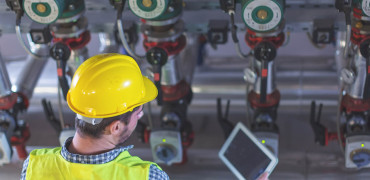The case for heat pumps to be the default technology for home heating and hot water just got stronger.
And with that, so has the future for the decarbonisation of home heating.
As a heat pump manufacturer, we have moved up a gear to use a low global warming potential (GWP) refrigerant that can efficiently heat the home and hot water to a high temperature – but not the earth.
For the environmental conscious householder, we have introduced the Ecodan R290 heat pump.
We have built upon our years of experience of manufacturing heat pumps to introduce this new model from our factory in Livingston, Scotland, that is quiet, energy efficient and allows for multiple zone control.
The Ecodan R290 will reach a heating temperature of 75°C matching that of a gas boiler
Very low GWP
The factory recently celebrated 30 years of manufacturing and the production of its five-millionth product, which happened to be the Ecodan R290 heat pump.
Using R290, a hydrocarbon (HC) refrigerant with a GWP of just 3, this heat pump can achieve high Coefficient of Performance (COP) values greater than four in heating mode, means higher heating performance; with a cost-of-living crisis, this also means enhanced energy savings and reduced operational costs for a household.
Legislation in the UK means that new homes built from 2025 will need to produce 80% less carbon emissions than homes built under the current Building Regulations (prior to this year’s interim PART L uplift).
Well-constructed and insulated new houses should be ready made for heat pump installation; environmentally determined developers will also provide solar panels and battery storage that can power heat pumps as well as electric car charging points.
High temperatures
Further UK government intervention, not least because of an obligation to meet a legally set net zero target of 2050, has resulted in households being offered a £7,500 incentive to switch from fossil fuel boilers to heat pumps.
This should encourage households who are retrofitting older properties to replace carbon producing gas and oil boilers with low carbon alternatives, such as heat pumps.
The Ecodan R290’s capacity to heat a home when it’s -15°C outside and to reach a high heating temperature of 75°C, which matches that of a gas boiler, make it a very attractive pro-environment heating and hot water option.
Such a capability means that a house can be warmed very effectively, and water can be heated to a high temperature to provide plenty of hot water for a large family.
Because of its high temperature competence, some may opt for an R290 without installing energy saving measures to the property – but because of the current structure of electricity prices this will increase costs and is not recommended.
Low emissions
For a typical household (using Ofgem definition and the recent October price cap figures) running the system at a lower flow temperature would result in greater overall savings; and even more can be gained if the household can integrate with solar PV panels or access an agile tariff and utilise the energy storage via a buffer tank.
Of course, the lower the electricity prices get the more efficient the system and greater savings for the homeowner.
As we look for more sustainable forms of living, we seek ways to lower carbon emissions and to achieve net zero by taking actions to prevent home heat loss, use less energy, and lower energy bills.
Installing a heat pump to decarbonise home heating that has a low global warming potential and also offers a high level of performance, as in the Ecodan R290, shows a path away from fossil fuel boilers to comfortable home heating that doesn’t heat or cost the earth.
Joanna Crown, Product Marketing Manager




